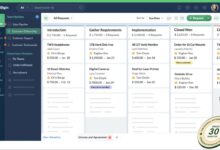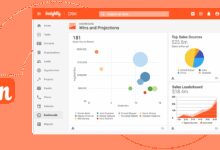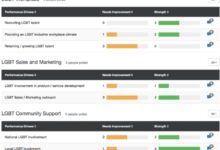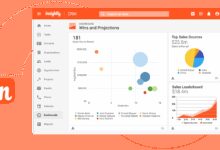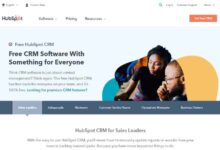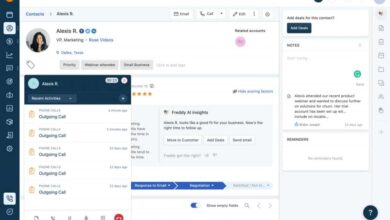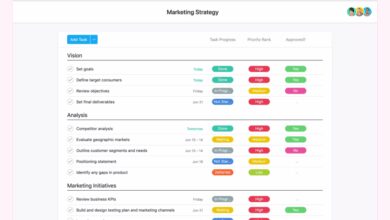CRM Software Small Business: 7 Powerful Tools to Skyrocket Growth
Running a small business is thrilling—but juggling customer relationships manually? That’s a recipe for burnout. Enter CRM software for small business: your secret weapon to organize, automate, and grow smarter.
Why CRM Software Small Business Owners Can’t Afford to Ignore

Customer Relationship Management (CRM) software isn’t just for enterprise giants. Small businesses today face fierce competition, rising customer expectations, and the constant pressure to do more with less. A CRM levels the playing field by centralizing customer data, streamlining communication, and boosting sales efficiency.
What Exactly Is CRM Software?
At its core, CRM software is a digital system that helps businesses manage all interactions with current and potential customers. It acts as a centralized hub for contact information, sales history, communication logs, and customer preferences.
For small businesses, this means no more scattered spreadsheets, forgotten follow-ups, or missed opportunities. Whether you’re a solopreneur or a team of ten, a CRM ensures every customer touchpoint is tracked and actionable.
Key Benefits for Small BusinessesImproved Customer Retention: By tracking customer behavior and preferences, you can personalize interactions and build stronger loyalty.Increased Sales Efficiency: Automate lead tracking, follow-ups, and pipeline management to close deals faster.Better Team Collaboration: Share customer insights across departments—sales, marketing, and support—so everyone’s on the same page.Data-Driven Decisions: Access real-time reports and analytics to understand what’s working and where to improve.”A CRM isn’t just a tool—it’s a strategy.Small businesses that adopt CRM see up to 29% increase in sales performance.” — Nucleus ResearchTop 7 CRM Software Small Business Solutions in 2024With dozens of CRM platforms on the market, choosing the right one can feel overwhelming.
.We’ve narrowed it down to seven of the most effective, user-friendly, and affordable CRM software small business options available today..
crm software small business – Crm software small business menjadi aspek penting yang dibahas di sini.
1. HubSpot CRM
HubSpot CRM is a favorite among small businesses for its powerful free plan and seamless integration with marketing, sales, and service tools. It’s intuitive, scalable, and packed with features that grow with your business.
- Free forever plan with unlimited users
- Email tracking, meeting scheduling, and live chat
- Integration with Gmail, Outlook, and social media
HubSpot’s strength lies in its ecosystem. As your business grows, you can upgrade to paid marketing, sales, or service hubs without switching platforms. Learn more at HubSpot.com.
2. Zoho CRM
Zoho CRM offers exceptional value with a robust feature set at a competitive price. It’s ideal for small businesses that want automation, AI insights, and customization without breaking the bank.
- AI-powered sales assistant (Zia)
- Workflow automation and sales forecasting
- Mobile app with offline access
Zoho CRM integrates with over 40 Zoho apps and 1,000+ third-party tools like QuickBooks and Mailchimp. Its multichannel support—email, phone, social, chat—makes it a versatile choice. Explore Zoho CRM here.
3. Salesforce Essentials
Salesforce isn’t just for big corporations. Salesforce Essentials is a simplified, affordable version tailored for small businesses with up to 10 users.
- Customizable sales pipelines
- Email integration and activity tracking
- Real-time dashboard and reporting
It’s built on the same powerful Salesforce platform, so you get enterprise-grade security and scalability. While it’s pricier than some competitors, the ROI in productivity and data accuracy is significant. Visit Salesforce Essentials.
crm software small business – Crm software small business menjadi aspek penting yang dibahas di sini.
4. Freshsales (by Freshworks)
Freshsales stands out for its AI-driven insights and intuitive interface. It’s designed for sales teams that want to prioritize leads, automate follow-ups, and close deals faster.
- Lead scoring and behavior tracking
- Visual deal pipeline and call tracking
- Integrated phone and email
The platform’s AI assistant, Freddy, helps predict deal closures and recommends next steps. Freshsales also offers a free plan for up to 3 users, making it accessible for startups. Check out Freshsales.
5. Insightly
Insightly is perfect for small businesses that need project management alongside CRM. If your sales cycle involves complex workflows or long-term client projects, Insightly bridges the gap.
- Project and task management integration
- Customer relationship linking
- Workflow automation and email integration
It’s particularly popular with consulting firms, contractors, and service-based businesses. Insightly’s strength is its ability to connect people, projects, and profits in one place. Discover Insightly.
6. Pipedrive
Pipedrive is built for sales-focused small businesses. Its visual sales pipeline makes it easy to track deals from lead to close, and its automation tools reduce manual work.
- Drag-and-drop sales pipeline
- Activity reminders and email integration
- Customizable reports and forecasts
Pipedire’s user-friendly design makes onboarding quick, and its mobile app ensures you’re never out of touch with your pipeline. It’s a top choice for startups and sales-driven teams. Explore Pipedrive.
crm software small business – Crm software small business menjadi aspek penting yang dibahas di sini.
7. Agile CRM
Agile CRM combines sales, marketing, and service features in one affordable package. It’s a great all-in-one solution for small businesses that want maximum functionality without complexity.
- Marketing automation (email campaigns, landing pages)
- Telephony and web analytics
- Customer support ticketing system
With a free plan for up to 10 users, Agile CRM is one of the most cost-effective options. While it may not be as polished as some competitors, its feature density is impressive. Visit Agile CRM.
How to Choose the Right CRM Software Small Business Fit
Selecting the right CRM isn’t just about features—it’s about fit. A tool that works for a retail startup might not suit a B2B consulting firm. Here’s how to make the right choice.
Assess Your Business Needs
Start by asking: What are your biggest pain points? Is it lead tracking? Follow-up delays? Poor customer service? Map these challenges to CRM capabilities.
- Do you need email integration?
- Is mobile access essential?
- Do you run marketing campaigns?
- Do you manage projects or service tickets?
Answering these questions helps narrow your options. For example, if marketing automation is key, HubSpot or Agile CRM might be ideal. If sales pipeline visibility is critical, Pipedrive shines.
Consider Scalability and Integration
Choose a CRM that can grow with you. Will it support more users? Can it integrate with your accounting software, email platform, or e-commerce store?
crm software small business – Crm software small business menjadi aspek penting yang dibahas di sini.
Look for CRMs that offer APIs or native integrations with tools like:
- QuickBooks or Xero (accounting)
- Mailchimp or Constant Contact (email marketing)
- Shopify or WooCommerce (e-commerce)
- Google Workspace or Microsoft 365 (productivity)
Integration reduces data silos and manual entry, saving time and reducing errors.
Budget and Pricing Transparency
Most CRM software small business plans charge per user per month. Free tiers are great for testing, but paid plans unlock essential features.
- HubSpot: Free plan available; paid starts at $45/user/month
- Zoho CRM: Free for up to 3 users; paid starts at $14/user/month
- Salesforce Essentials: $25/user/month
- Freshsales: Free for up to 3 users; paid starts at $15/user/month
- Insightly: Starts at $29/user/month
- Pipedrive: Starts at $14.90/user/month
- Agile CRM: Free for up to 10 users; paid starts at $9.99/user/month
Watch out for hidden costs like setup fees, training, or add-ons. Always test the software with a free trial before committing.
Implementing CRM Software Small Business: Best Practices
Buying a CRM is just the first step. Successful implementation is what drives real results. Many small businesses fail not because of the tool, but because of poor adoption and setup.
Start with Clear Goals
Define what success looks like. Is it a 20% increase in lead conversion? A 30% reduction in response time? Clear goals guide your CRM setup and help measure ROI.
crm software small business – Crm software small business menjadi aspek penting yang dibahas di sini.
Break down your objectives into measurable KPIs:
- Number of leads converted per month
- Average deal closure time
- Customer satisfaction score (CSAT)
- Sales team productivity (calls, emails, meetings)
Train Your Team Effectively
No matter how intuitive a CRM is, your team needs proper training. Schedule onboarding sessions, create quick-reference guides, and assign a CRM champion.
Common training topics include:
- How to log calls and emails
- Updating deal stages
- Setting reminders and tasks
- Generating reports
Encourage feedback and address concerns early. Adoption is higher when users see the CRM as a helper, not a hurdle.
Migrate Data Carefully
Transferring data from spreadsheets or old systems requires planning. Clean your data first—remove duplicates, standardize formats, and verify contact details.
Most CRMs offer import tools for CSV files. Test with a small batch first to ensure accuracy. If you have complex data or large volumes, consider professional migration services.
crm software small business – Crm software small business menjadi aspek penting yang dibahas di sini.
“Data quality is the foundation of CRM success. Garbage in, garbage out.” — Gartner
Common CRM Software Small Business Mistakes to Avoid
Even with the best tools, mistakes can derail your CRM efforts. Here are the most common pitfalls and how to avoid them.
Overcomplicating the Setup
It’s tempting to customize every field and automate every workflow from day one. But complexity kills adoption.
Start simple. Focus on core functions: contact management, lead tracking, and communication logging. Add advanced features only when your team is comfortable.
Ignoring Mobile Access
Today’s small business owners are on the move. If your CRM doesn’t have a reliable mobile app, you’ll miss updates and delays will pile up.
Ensure your CRM offers a robust mobile experience with offline access, push notifications, and voice-to-text logging.
Not Using Automation
One of the biggest missed opportunities is underusing automation. Simple automations like follow-up emails, task reminders, or lead assignment can save hours each week.
crm software small business – Crm software small business menjadi aspek penting yang dibahas di sini.
Start with basic workflows:
- Send a welcome email when a lead is added
- Assign leads to team members based on location or product interest
- Remind sales reps to follow up after a meeting
Automation isn’t about replacing humans—it’s about freeing them to focus on high-value tasks.
Measuring CRM Success: Key Metrics to Track
How do you know if your CRM software small business investment is paying off? Track these key performance indicators (KPIs) regularly.
Sales Performance MetricsConversion Rate: Percentage of leads that become customers.A rising trend indicates better lead management.Average Sales Cycle Length: Time from lead to close.Shorter cycles mean more efficiency.Win Rate: Percentage of opportunities won vs.lost.Helps identify strengths and weaknesses in your sales process.Customer Experience MetricsCustomer Satisfaction (CSAT): Measured via post-interaction surveys.Net Promoter Score (NPS): Indicates customer loyalty and likelihood to recommend.First Response Time: How quickly your team responds to inquiries..
Faster responses improve satisfaction.Operational Efficiency MetricsData Entry Time: Time spent logging interactions.Should decrease with CRM use.User Adoption Rate: Percentage of team members actively using the CRM.Aim for 90%+.Report Usage: How often reports are accessed.Indicates data-driven decision-making.Review these metrics monthly.Use insights to refine your processes, retrain staff, or adjust CRM settings..
Future Trends in CRM Software Small Business
CRM technology is evolving fast. Small businesses that stay ahead of trends gain a competitive edge. Here are the key developments shaping the future.
crm software small business – Crm software small business menjadi aspek penting yang dibahas di sini.
AI and Predictive Analytics
Artificial intelligence is no longer sci-fi. Modern CRMs use AI to predict customer behavior, recommend next steps, and automate responses.
For example, Zoho’s Zia and Freshsales’ Freddy analyze past interactions to forecast deal closures and suggest optimal follow-up times. AI-powered chatbots can handle routine inquiries, freeing up human agents.
Integration with Communication Platforms
CRMs are becoming deeply integrated with tools like Slack, Microsoft Teams, and WhatsApp. This allows teams to log conversations, assign tasks, and update records without switching apps.
Look for CRMs that offer native integrations or APIs for your preferred communication tools.
Enhanced Mobile and Offline Capabilities
As remote work grows, mobile CRM functionality is essential. Future CRMs will offer richer offline experiences, voice command support, and augmented reality for field service teams.
Expect more intuitive interfaces, real-time sync, and location-based features for sales reps on the go.
crm software small business – Crm software small business menjadi aspek penting yang dibahas di sini.
What is the best CRM software for small business?
The best CRM depends on your specific needs. HubSpot CRM is excellent for marketing-focused businesses, Pipedrive excels in sales pipeline management, and Zoho CRM offers the best value for money. Try free versions of top contenders to see which fits your workflow.
Is CRM software worth it for small businesses?
Absolutely. CRM software small business tools improve organization, boost sales, and enhance customer relationships. Even a basic CRM can save hours per week and increase revenue through better lead management and follow-up.
Can I use CRM software for free?
Yes, several CRM platforms offer free plans. HubSpot, Zoho, Freshsales, and Agile CRM all have robust free tiers suitable for small teams. These often include core features like contact management, email tracking, and basic reporting.
crm software small business – Crm software small business menjadi aspek penting yang dibahas di sini.
How long does it take to implement a CRM?
Implementation time varies. With a simple CRM and clean data, you can be up and running in a few days. More complex setups with integrations and training may take 2–4 weeks. Start small and scale gradually.
Do I need IT support to use CRM software?
Most modern CRM software small business solutions are designed for non-technical users. Setup, data import, and basic customization can be done without IT help. However, for advanced integrations or custom development, technical support may be needed.
Choosing the right CRM software small business solution can transform how you manage customer relationships. From boosting sales efficiency to improving customer satisfaction, the benefits are clear. The key is to start with your needs, involve your team, and choose a scalable, user-friendly platform. With the right CRM, even the smallest business can operate like a well-oiled machine.
Further Reading:

